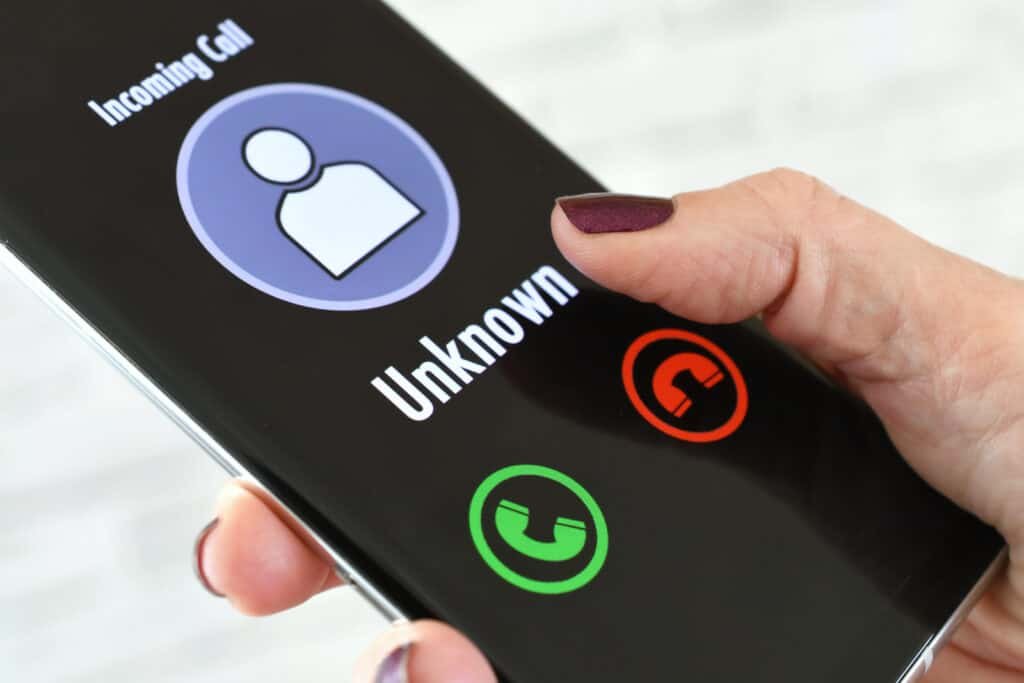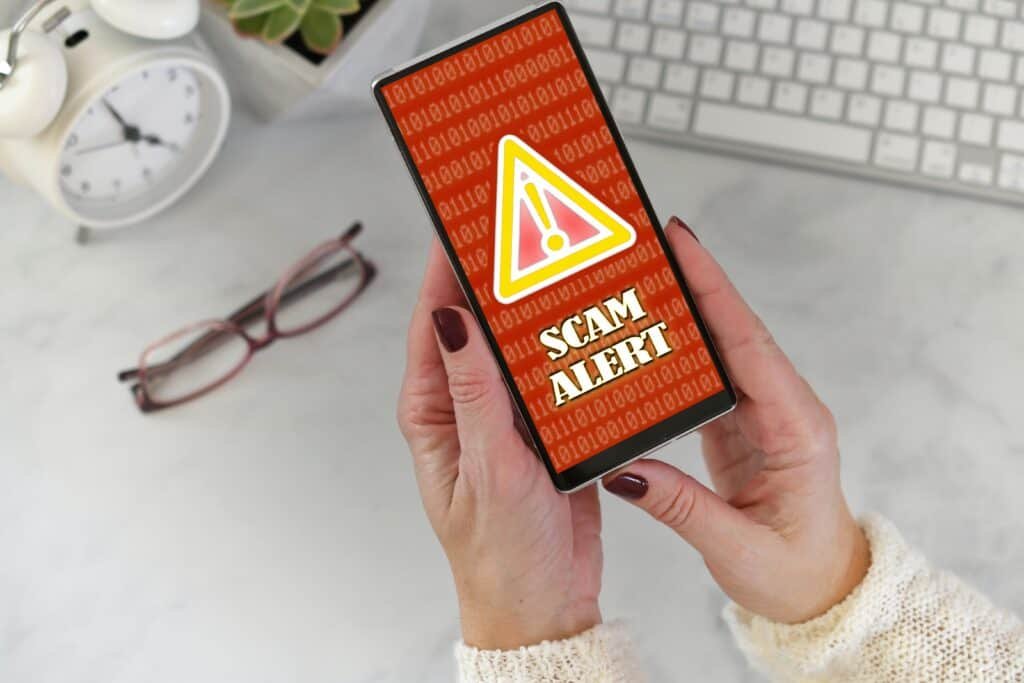Identifying HMRC Scam Calls: How to Spot and Report Fake Tax Fraud Calls

We may earn a small fee from the companies mentioned in this post.
Every day, countless individuals fall victim to HMRC scam calls. Are you aware of the tactics scammers use to deceive taxpayers? In this blog post, we will guide you through the process of identifying and reporting HMRC scam calls and how to protect yourself from falling victim to these scams. Stay vigilant and informed to ensure your hard-earned money stays safe.
Key Takeaways – HMRC Scam Calls
Recognise HMRC scam calls and be aware of their tactics.
- Spot text and phone scams claiming to be from HMRC
Verify phone numbers, direct messages and emails to protect against scams.
Take proactive steps such as using strong passwords and monitoring accounts for suspicious activity to stay secure from frauds.
Recognising HMRC Scam Calls

The first step in protecting yourself from HMRC scam calls is recognizing the tactics scammers use to deceive individuals. Scammers often employ automated scam phone calls, threatening language, and urgent requests for information to manipulate people into providing personal and financial details.
A clear understanding of these tactics will enable you to identify and steer clear of such scams.
Automated Messages
An automated message claiming to be from HMRC is a telltale sign of an automated phone call scam. HMRC will never use automated voice call systems to contact taxpayers.
Phone scams are a growing concern, with telephone scammers often using various methods to create an illusion of legitimacy. They often request financial details such as bank account information or debit/credit card information during these calls. Be cautious of such calls and always verify the source before providing any personal information.
Threatening Language
Scammers often employ aggressive language, such as threats of legal action or arrest, to pressure victims into taking immediate action without thinking critically about the situation.
Maintaining composure in these situations will help prevent rushed decisions that can jeopardize your personal or financial security.
Urgent Requests for Information
Fraudsters often create a sense of urgency to obtain personal and financial information quickly. These requests may involve scenarios where a prompt response is imperative to address an urgent requirement or resolve an issue expeditiously.
Upon receiving an urgent information request, ensure you validate the source and its legitimacy before sharing any details.
You may find our informative article on how to spot an HMRC scam letter useful
Types of HMRC Scam Calls

Scammers use various tactics to deceive individuals, including tax refund scams, national insurance number fraud email tax scams, and outstanding tax bill scams.
A thorough comprehension of these scam types can help fortify your defence against fraudsters.
Tax Refund Scams
Tax refund scams involve scammers offering fake tax rebates and tax rebate schemes via phone, email, or text, requesting personal information and bank account details.
If you receive an email or text message claiming to offer a tax refund, be cautious and verify the source before providing any information. HMRC will never request personal or financial information through social media, telephone or email.
National Insurance Number Fraud
In national insurance number fraud, fraudsters claim your National Insurance number has been compromised and request personal details to resolve the issue. Be vigilant of any calls or emails asserting that your National Insurance number has been breached and avoid providing personal information, including your address, date of birth, or bank details.
Outstanding Tax Bill Scams
Outstanding tax bill scams involve scammers contacting individuals through texts, emails, or telephone calls, either offering a purported refund or demanding payment for alleged outstanding tax bills. They may purport to be from HMRC and use threats of legal action or arrest to intimidate victims.
If you receive a call or email claiming that you owe an outstanding tax bill, remain calm and verify the authenticity of the communication before providing any personal or financial information.
Checkout our article on identifying scams
How to Verify Genuine HMRC Contact

Authenticating HMRC communication is crucial for your protection against scams. By checking phone numbers, direct messages, and emails through official channels, you can ensure that you are dealing with a genuine HMRC contact and not falling victim to fraudsters.
HMRC provides a range of resources to help you identify and report suspicious activity. You can.
Verifying Phone Numbers
If contacted by phone, ask questions only HMRC would know and independently research the organisation’s number before calling back. This will help you determine the legitimacy of the call and ensure you are not providing sensitive information to scammers.
Keep in mind, prudence and verification of a call’s origin are advisable before discussing any personal or financial details or sharing personal or financial information.
Direct Messages and Emails
HMRC will never request personal or financial information through social media or email. If you receive a message claiming to be from HMRC, take the time to verify its authenticity through official channels before responding or providing any information.
Forward phishing emails to phishing@hmrc.gov.uk and delete the scam email. Maintaining vigilance and verifying dubious messages can shield you from becoming a scam victim.
Checkout our informative article on what a cyber attack means
Reporting HMRC Scam Calls

Reporting scam phone calls, text messages, and emails to HMRC and Action Fraud is an important step in protecting yourself and others from fraud. Reporting these scams not only increases awareness, but also prevents others from becoming victims of the same scams.
It also helps the authorities to identify and investigate the criminals behind the scams. This information can be useful.
Reporting Phone Calls
Report suspicious phone calls to Action Fraud and provide any relevant contact details below. This will help authorities track down the scammers and prevent them from targeting others.
If a call’s authenticity is questionable, it’s preferable to report it and allow the authorities to ascertain its legitimacy.
Learn to protect yourself from phone scams, read our informative blogpost and protect yourself.
Reporting Text Messages
Forward phishing texts to 60599 and delete the message. By reporting these messages, you help raise awareness of the phishing scams and protect others from falling victim.
Keep in mind, it’s safer to report dubious messages rather than risking your personal or financial information.
You may find our article on protecting yourself from telephone scammers useful
Reporting Emails
Forward phishing emails to phishing@hmrc.gov.uk and delete the phishing email. By reporting these emails, you help raise awareness of the scams and protect others from falling victim.
Remember, it is always better to be cautious and report suspicious emails than to risk compromising your personal or financial information.
Protecting Yourself from HMRC Scam Calls

Protecting yourself from HMRC scam calls involves a combination of strong passwords, monitoring accounts for suspicious activity, and staying updated on scam alerts.
Employing these strategies can bolster the protection of your personal and financial information against the evolving tactics of scammers.
Strong Passwords and Security Measures
The implementation of unique, complex passwords and two-factor authentication are crucial measures for securing your accounts. Strong passwords should include a combination of upper and lowercase letters, numbers, and symbols, and should not include easily guessable words.
Two-factor authentication adds an extra layer of security by requiring a code sent to your phone or email address, or utilising biometric authentication such as a fingerprint or facial recognition.
You may find our infrmative article on creating secure password useful
Monitoring Accounts
Regularly check your accounts for unauthorised transactions or changes. Monitoring your accounts helps you identify suspicious activity early on, allowing you to take swift action to mitigate potential damage.
If you detect any unauthorised transactions, contact your bank or payment provider immediately.
Staying Updated on Scam Alerts
Follow HMRC’s official website and sign up for scam alerts to stay informed about the latest threats. Staying updated on scam alerts enhances your awareness of scammers’ tactics and helps guard against their schemes.
Maintaining vigilance and implementing necessary protective measures are key to safeguarding yourself from scams.
What to Do If You Fall Victim to an HMRC Scam Call

Should you fall prey to an HMRC scam call, taking immediate action is vital to minimise damage and shield others from similar scams.
Contact your bank or payment provider and report the incident.
Contacting Your Bank or Payment Provider
Inform your bank or payment provider immediately to secure your accounts and prevent further losses. Alerting your bank or payment provider enables them to take protective financial measures, such as freezing your account or cancelling unauthorised transactions.
Acting swiftly and reaching out to your bank or payment provider at the earliest notice is crucial.
Reporting the Incident
Report the scam to HMRC, Action Fraud, and any relevant authorities to help protect others from falling victim to the same scam.
Reporting the incident aids in heightening scam awareness and bolstering authorities’ efforts in apprehending and halting scammers.
You may find our article on How to spot HMRC Scam Letters useful
Summary – HMRC Scam Calls
In conclusion, identifying and reporting HMRC scam calls is vital in protecting yourself and others from falling victim to these scams.
There are thousands of people claiming to represent HMRC, you must stay vigilant and informed by recognising common scam tactics, verifying the authenticity of HMRC communications, and reporting any suspicious activity, albeit from calls emails and text messages.
By taking these steps, you can safeguard your personal and financial information and help put an end to these scams.
Frequently Asked Questions
Is there a scam phone call from HMRC?
It is clear that there is a scam phone call from HMRC, with reports of an automated message claiming they are filing a lawsuit against you and asking you to press 1 to speak to a caseworker. This call should be immediately ended as it is not a genuine HMRC call.
How do I stop fake HMRC calls?
To stop fake HMRC calls, report any suspicious emails, texts or phone calls to HMRC through their website’s online form or by emailing phishing@hmrc.gov.uk and forwarding details of the suspicious calls or meesages. You may also text the details of the scam to HMRC vis the 60599 SMS number. Additionally, you can disconnect from the cold caller by calling another number before contacting your bank.
What is 0300 200 3819?
0300 200 3819 is a deceptively similar number to each of HMRC’s contact numbers, and is included in scam letters claiming to have been sent by HMRC.
Does HMRC contact you by email?
Yes, HMRC may contact customers by email for various reasons such as sending annual tax summaries, confirming details for Making Tax Digital, promoting the personal tax account or reminding customers who have opened Help to Save accounts.
What should I do if I receive a suspicious email or text claiming to offer a tax refund?
These emails are sent to customers who have provided their email address to HMRC. They are sent to inform customers of important changes or updates to their tax affairs. Customers can also opt-in to receive emails about other HMRC services.
What should I do if I receive a suspicious email or text claiming to offer a tax refund?
Verify the source and do not provide any personal or financial information before confirming the email address is genuine. Do not respond to suspicious emails or texts claiming to offer a tax refund.
Why is HMRC calling me?
HMRC rarely contacts individuals via phone for initial communication. If you receive an unexpected call claiming to be from HMRC, exercise caution. It’s likely a scam aimed at obtaining your personal or financial information. HMRC usually communicates through post or your online tax account for matters like tax refunds, audits, or outstanding payments. Always verify through official channels before taking any action.
External Refernce Information
- HMRC – GOV.UK
- Website: https://www.gov.uk/report-suspicious-emails-websites-phishing
- Description: This is the official UK government page for reporting phishing and scams. It includes information on recognising HMRC-related scams, including scam letters, emails, and texts, and provides guidance on how to report them.
- Action Fraud
- Website: https://www.actionfraud.police.uk/
- Description: Action Fraud is the UK’s national reporting center for fraud and cybercrime. They provide detailed information on various types of scams, including HMRC scam letters, and offer a platform for individuals to report fraudulent activities.
- Citizens Advice
- Website: https://www.citizensadvice.org.uk/consumer/scams/check-if-somethings-a-scam/
- Description: Citizens Advice offers guidance on how to recognise and report scams, including HMRC scam letters. They provide practical advice on what to do if you’ve been scammed and how to get support.
With over three decades of experience in the heart of London’s financial sector, I have dedicated my career to the pursuit of robust cybersecurity practices and IT leadership. As a Certified Information Systems Security Professional (CISSP), Certified Information Security Manager (CISM), Certified Chief Information Security Officer (C|CISO), Certified Ethical Hacker (CEH), and Computer Hacking Forensic Investigator (CHFI), I bring a wealth of knowledge and expertise to the table.
My journey in the field of cybersecurity has not only been about personal growth but also about sharing my insights with others. As an international speaker, I have had the privilege of addressing audiences worldwide, discussing the importance of cybersecurity in today’s digital age. My passion for knowledge sharing extends to my work as an author and blogger, where I delve into the complexities of cybersecurity, offering practical advice and thought leadership.
In my role as a CISO and Head of IT, I have overseen the development and implementation of comprehensive information security and IT strategies. My focus has always been on creating resilient systems capable of withstanding the evolving landscape of cyber threats.
My Master’s degree in Cybersecurity has provided a solid academic foundation, which, when combined with my practical experience, allows me to approach cybersecurity from a holistic perspective.
I am always open to connecting with other professionals in the field, sharing knowledge, and exploring new opportunities. Let’s secure the digital world together.

